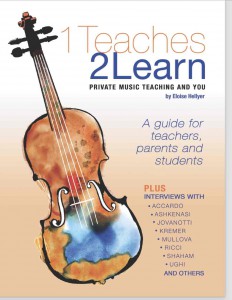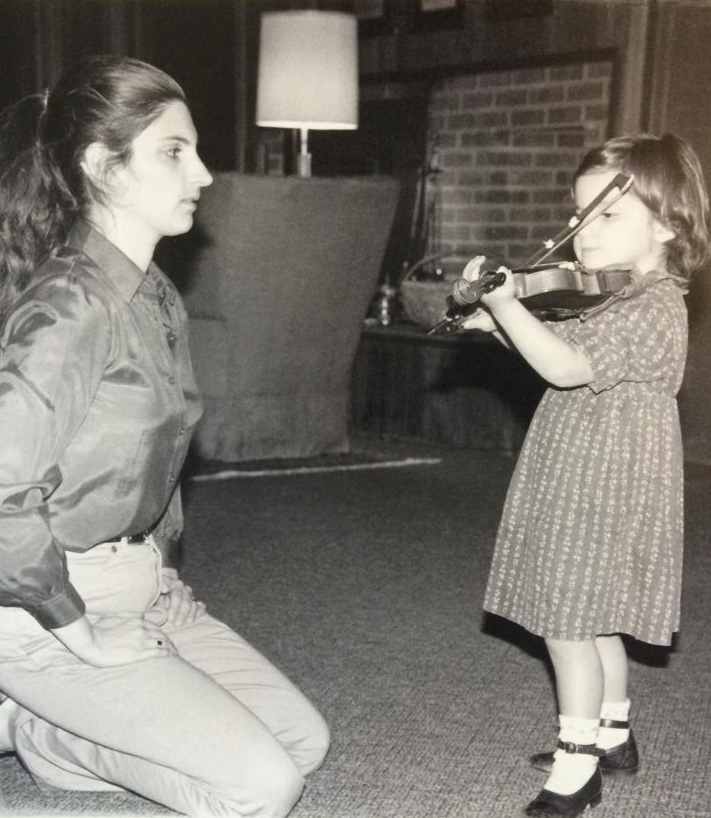Why Playing Music Helps Raise Your Wisdom Level
or, What’s So Hard About the Violin, Anyway?
In my last post I maintain that learning and playing the violin is difficult for everyone, whatever the level of intelligence and coordination, but for those of you who are not violinists or musicians (or perhaps are the prospective parents of one), I’ll try to explain why. Below is my theory formed after years of observing my students, other musicians, and myself.
I tell my students that playing the violin is not just difficult – it’s impossible, which is why even great and famous violinists still have to practice (and why even then they sometimes make mistakes). Whenever I have to break down some piece of technique for my students into ever smaller steps so they can learn them, I marvel at how many things violinists have to do at the same time and how fast their minds and bodies have to move in order to do them. In fact, things go so fast that it seems that everything is done simultaneously. This is not true. It is always step 1 to step 5000 in a nano-second, perhaps, but always in order. And this is only one reason we have to practice so much for years – to get the order right so that we can do it without consciously thinking about it, thus to permit ourselves to focus on the music.
We also have to hear every note we play BEFORE we play it – not afterwards. This seems impossible when we play at what seems the speed of light, but it is true – if we don’t know what we want to hear, how can we play it or even get it in tune? I tell my students that we are not just training their hands, but training their ear to be ever faster than their hands so that their hands are directed by their ear instead of vice versa. (The hands may or may not move faster than the eye, but they certainly move faster than the ear if not trained to do otherwise.)
Not only that, we must think about what we want to hear, what we are actually doing and what we are going to do next without ever thinking about what we have just done. This takes incredible mental discipline, acquired over years of practice.
Human beings are made of three components: the body, the mind and the soul – or spirit, emotions, whatever you want to call the spiritual part of yourself. To play the violin, or any complicated instrument, you must have an exquisitely trained body, and an extremely acute and disciplined mind to understand the music, practice and play it, and plan your interpretation. And without the soul or the emotions, you will sound like a robot or a computer which, of course, will not get you far. The problem is that the spirit cannot really speak UNTIL the body and the mind have been trained to the point that technique, reading and memorization are almost automatic. Only then can there be real interpretation, transmission and even spontaneous inspiration. What makes it all really difficult is that in order to play well, all three elements – mind, body and soul – have to be present at the same level (100%) simultaneously. How many activities can you think of that require the presence of all three of these elements at the highest level at the same time? None come to my mind. Many activities may require two of the three but very few things put the demands on our whole selves that playing music does.
This is why playing a complicated musical instrument like the violin will make you smarter. It trains EVERYTHING and, more importantly, trains what comprises this everything to work together.
Further, you may ask why it is that we like to play an instrument like the violin if it’s so difficult and demanding. My theory is that when we play, it is one of the few times in our lives that we are completely whole human beings – that we are using all of our resources at the same time to the utmost level we are capable of and it feels good. That’s why even small children like to play.
This is why playing a complicated musical instrument like the violin will give you discipline: everyone likes to play and few like to practice, but practice you must and it can be dreary, tiring and even boring at times – but this is good for us, too, It teaches us to perform a task and do it well even when we don’t feel like it or don’t particularly enjoy it, in order to create something greater. It teaches us to have goals and to develop the persistence necessary to achieve them. In essence it helps us to raise our wisdom levels so we are nevermore “too smart for our own good.”
Post Author: Eloise Hellyer
Share this:
Buy it on www.sharmusic.com - eBook format, avaliable worldwide, paperback in North America
COPYRIGHT
ABOUT
A music teacher’s thoughts and observations on the teaching and the study of a musical instrument, hoping to be of help to parents, students and teachers.
PHOTO
AWARDED TOP 25 VIOLIN BLOG
CATEGORIES
TAGS
ARCHIVES
-
Agosto 2022
Agosto 2023
Agosto 2024
April 2015
April 2016
April 2017
April 2019
April 2020
Aprile 2022
Aprile 2023
Aprile 2024
August 2014
August 2015
August 2016
August 2017
August 2018
August 2019
August 2021
December 2014
December 2015
December 2016
December 2017
December 2018
December 2019
December 2020
Dicembre 2022
Dicembre 2023
Dicembre 2024
Febbraio 2022
Febbraio 2023
Febbraio 2024
February 2015
February 2016
February 2018
February 2019
February 2020
February 2021
Gennaio 2022
Gennaio 2023
Gennaio 2024
Giugno 2022
Giugno 2022
Giugno 2023
Giugno 2024
January 2015
January 2016
January 2017
January 2018
January 2019
January 2020
July 2015
July 2017
July 2019
June 2016
June 2017
June 2018
June 2019
June 2020
June 2021
Luglio 2022
Luglio 2023
Luglio 2024
Maggio 2022
Maggio 2023
Maggio 2024
March 2015
March 2016
March 2017
March 2018
March 2019
March 2020
March 2021
Marzo 2022
Marzo 2023
Marzo 2024
May 2015
May 2016
May 2018
May 2019
May 2020
November 2014
November 2015
November 2016
November 2017
November 2018
November 2019
November 2021
Novembre 2022
Novembre 2023
Novembre 2024
October 2014
October 2015
October 2017
October 2018
October 2019
October 2020
October 2021
Ottobre 2022
Ottobre 2023
Ottobre 2024
September 2014
September 2015
September 2016
September 2018
September 2019
September 2020
September 2021
Settembre 2022
Settembre 2023
Settembre 2024
RECENT POSTS
Terry G and Me, or Terry Gilliam on Where (or What) Practicing the Piano Will Get You…
The Teaching We Don’t Do Is More Important Than We Think
Overwhelmingness or What Teaching and Motherhood* Have in Common
Cellphone Serenity
How to Build Your Reputation – the Kind You Want
Desperate Times, Desperate Measures. Or How to Deal With Your Strong-Willed Stubborn Student and Survive
“Why Does My Teacher Get So Frustrated?” Letter to a Perplexed Student
Mount Rush-no-more….And How to Get There
Realizzato con VelociBuilder - Another Project By: Marketing:Start! - Privacy Policy




